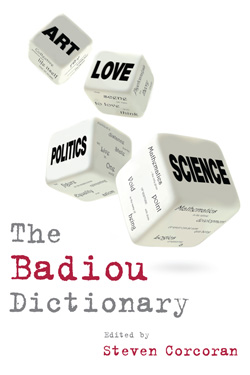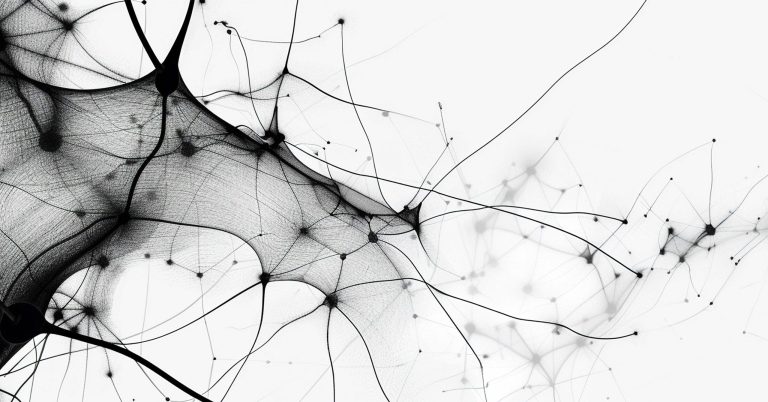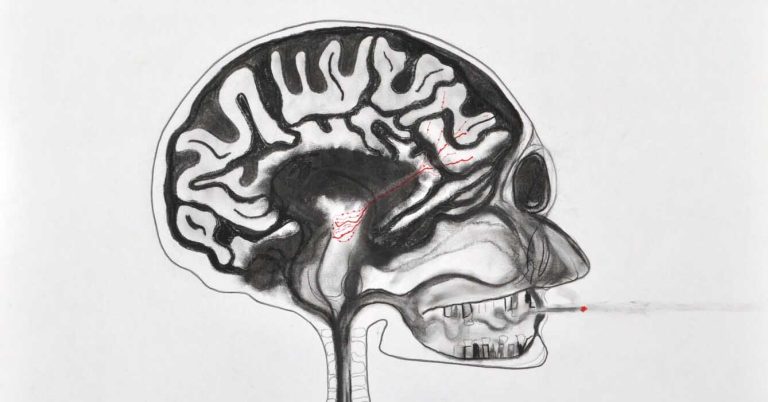

POLITICS by Steven Corcoran
The problem of how philosophy is to approach the word politics is especially difficult, as it is itself a stake of political struggle and thus steeped in equivocity. When nineteenth-century workers and feminist movements considered themselves to be engaging in politics it was to demonstrate against their ‘de-politicisation’, against their relegation to the status of non-political beings that existed in the social or private sphere. It was to show that the very designation by the powers that be of such spheres as non-political was itself a political act. In short, the question of just who is and who is not considered political, and what objects are part or are not part of political consideration, is itself always intrinsic to politics. Philosophy thus encounters the word politics as inherently equivocal or, in Badiou’s terms, as a ‘split word’.
Badiou’s treatment bears out this ‘inherently split’ aspect, which, he maintains is a key feature of politics, singling it out from the other domains in which truth is in question. Contrary to art, science or love, a political procedure is always determined, within itself, according to a schema that pits one politics against another. One can thus say that in order for politics to exist, the word politics must necessarily designate heterogeneous things. For there is no politics that is not obliged to name as ‘politics’ something that is adverse to it. As Badiou puts it: ‘Politics is an immanent procedure [based on an unconditioned decision], but a procedure that among its names includes the name politics in such a way that it is never its proper name’ (SEM 1991: October 24).
The upshot of this is that the name politics remains intrinsically equivocal within politics itself. If politics is thus a genuine concept, as Badiou contends that it is, it falls to philosophy to define it. Against the background of this equivocation, philosophy thus generally starts with a definition of politics. The difficulty in defining it is that, as aforementioned, this equivocation has to be grasped via the scission of the word: a scission that involves something that has no concern with truth, and which is intimately tied to the conflictual, equivocal ordeal of politics. So, if philosophy is constrained to seize politics in the element of truth, this entails the ineluctable purification of the name in philosophy, the history of which one can trace in all the great thinkers.
If political philosophy’s approach to this definition remains essentially tied to the question of why it is that people come together in a community, and seeks the ground for politics in sense, or in history, Badiou argues, by contrast, that we can only grasp politics as a radical subtraction from sense or history. This argument is, however, not without historical backing. As the historical mediations that were supposed to open onto communism lost all consistency, under the pressure of historical fluctuation and the evolution of political truth-procedures, Badiou drew the key lesson: history does not bear political subjects. For the philosopher, it thus became crucial to define the conditions for politics as a process of subtraction from history.
His notion of event, that Mallarmean throw of the dice that never abolishes chance, first introduced in CPBT, is a key part of his answer to this problematic. If politics is to be of interest for philosophy, if it is something other than games of power, state regulation, the management of desires, and so on, it must depend upon an exception to the formal rules of the state of the situation. As this exception can no longer be that of revolution, in which the party representing the working class aims to destroy the old state order in order to bring about a classless society – for reasons that are not essentially historical but that have to do with ontology and with politics as a procedure of thought – Badiou argues that the evental exception must be configured as a subtraction from the state.
It is his understanding of radical subtraction that enables Badiou to account for the split nature of the word politics. Grasping the word politics from the point of view of its scission means understanding it as designating both the immanent process of the unfolding of an egalitarian political prescription in fidelity to an event, i.e. the emergence of a possibility proscribed by the state of the situation, and practices of state, i.e. practices entirely removed from the immanence of truth. (Cf. Badiou’s distinction in M between the different – ‘interior’ and ‘exterior’ – modes of politics.)
Throughout his work, Badiou has maintained the key importance for philosophy of egalitarian politics as a procedure of thought in its own right. This has culminated in the idea that politics is thus not an object but a condition of philosophy (cf. BE, CS). Understanding politics as thought implies breaking with traditional identifications of politics, whether as that which is localised in the form of state, the community, or even in emancipation. Identifying politics with the figure of state sovereignty, political philosophy classically presents us with a typology of states, which it subjects to a normative evaluation, with the idea being to discern the good figure of sovereignty compatible with the good figures of the community. More revolutionary identifications of politics have in turn construed it as a form of organisation and consciousness through which people become emancipated from the figures of sovereignty or of the community. This was the core of the revolutionary model, wherein politics is identified with the historical movement of collective being such as it liberates itself through collective operations to de-link itself, through and in revolution, from such figures and affirm its generic nature.
Badiou’s understanding of politics as a condition owes much to this latter version of politics. It can indeed be read as the result of his working through of the operations by which the revolutionary identification of politics has, through its immanent problems and deadlocks, failed and called for greater attentiveness. Indeed, the idea that politics is not an object of philosophy but instead a singular procedure of thought that conditions philosophy is explicitly raised as a means to maintain philosophy’s alertness to singular and exceptional political occurrences and what they present that is new in thought.
So, understanding politics as a split word means grasping it in its subtraction from history, as a process of thought that cannot be reduced to the form of a unified object of philosophical speculation. Trying to produce a unified philosophical definition of it thus forgets that politics comes before philosophy – politics is not the practice that implements a philosophical theory. Politics itself is thought. If so, then it is crucial to maintain its immanence: political choice can be referred only back to the choice itself, nothing divine or transcendent prescribes the political subject.
Second, the name by which philosophy grasps this process is always anticipatory: it always relates to a ‘there will have been’ of the truth at stake in the procedure, i.e. it proceeds as if there was a being of political truth, as if the being at stake in political truth has come, will have come, to its being, whereas the infinite procedure of politics itself, forever caught in its incompletion, weaves its being from this process but without being coextensive with it. The philosophical name is an anticipation of the genericity of a politics, which is to say the surmise that, if it remains faithful to its axioms, it will have been true, it will have brought about a generic collective. In reality, however, a politics of emancipation does not bring about such a collective, but instead works within the framework of this genericity thanks to its always specific categories and practices. Its grasping by philosophy cuts straight toward the infinite, by giving a name to the infinity of the procedure, which is its being indeed, but its being forever yet to have come.
So, if it falls to philosophy to define politics, it also falls to it to maintain the separation between these registers. It must be upheld that the philosophical determination of politics is not itself political, since the naming of any collective that bears the political truth courts the risk of disaster. Philosophy must always desist from superposing its temporality, which points to the infinite, the eternal, onto the sequential temporality of politics. The result of not doing so is the projection of an intrinsic destiny or overarching history onto politics and its name, the price of which is that philosophy yields on the irreducible multiplicity of names and places of politics. There can be no projection onto the real of the procedure of the philosophical anticipation of the truth finally come. If politics is a philosophical category, it is only because there are singular political sequences, which is to say, rare, or discontinuous ones that are given in a heterogeneity of places and times through always unique categories. Otherwise it is a category of the state.
The question thus arises of philosophical nomination, of the name by which philosophy, in its anticipation, grasps the multiplicity of political names (e.g. Mao, Lenin, Spartacus. . .). Badiou surveys and mostly rejects the traditional names by which philosophy has received politics, notably since the French Revolution: community, liberty, fraternity, revolution, and so on. All are compromised in one way or another. The one he retains, equality, does not escape this: its particular problem is that it is itself hampered by a sort of economism, such that its philosophical use comes at the price of a threefold operation: 1) a desubstantialisation of the name: equality does not designate any delimitable figure of the collective, does not prescribe any social grouping. However, it does have the virtue of a kind of mathematical abstraction: equality is given in an axiomatic presentation. Without defining any of the terms, one can simply posit that ‘all people are equal among themselves’, and draw the consequences of this statement. If history can no longer be called upon to support political procedures, the breach must be filled with an axiomatisation that defines the criteria proper of the political event. The essential presupposition here is that every politics supposes an unconditioned prescription, i.e. that a politics stems from an event and relies on a prescription of equality not as that which is to be realised equality, not that which is to be realised, but that whose existence is to be postulated and its consequences created in the here and now (SEM 1991: October 24). 2) An indifferentiation of sense: under this axiomatic presentation, equality finds no guarantor in the register of sense, since it does not prescribe any sense (a sense that the opponents of equality could object to). Its abstraction allows it to play freely outside all hermeneutics in regard to the philosophical nominations of politics. 3) Equality has to be rendered adequate to the infinite, that is, appropriated for infinite situations.
By virtue of these features, argues Badiou, equality can and therefore must be legitimated as the category apt to manifest in the field of politics, what it means that only an egalitarian politics, from the viewpoint of philosophy, can authorise that our time turns toward eternity.
In company with Plato and Marx, what Badiou thus refuses is the idea that the state forms the transcendental of politics, that it organises in advance the pregiven domain of political action. The state (of the situation) relies on a logic of representation such that it infinitely exceeds the presentation of the situation. That is to say that it is impossible to measure the gap between the presentation of the situation (say, the count of all citizens, of those deemed to belong to the political situation) and its representation (the state’s ways of grouping this count into taxpayers, income brackets, ethnic identities, religious professions, and so on). This is because (in line with the axioms of transfinite set theory) the number of ways of grouping the initial set is infinitely larger than the initial set itself. Now, combined with the logic of the capitalist economy, a key norm of today’s state, an ideology of complexity emerges that is key to the prevailing vision of our ‘democratic materialist’ world – that there exists an immense complexity of groups and sub-groups, whose contradictions need to be regulated according to strategic insights; that the postmodern situation is so complex that it is impossible to find clear and universal principles of justice and instead it is necessary to find always new rules, technocratic or ethical, for negotiating between groups. But the postmodern state thrives on the idea of the necessary administration of complexity, which it presents as a bulwark against the old blood-soaked dreams of emancipation. What it thrives on in particular is the indetermination of this errancy, the indetermination of its superpower over the situation.
Far from making strategic judgements about the infinite complexities and complicities of history, far from engaging in interminable negotiations of culture and psychology, a genuinely political procedure will cut through this in order to make visible the inexistent element excluded by the state regulation of the normal order of things. For Badiou, defining politics in an adequate way involves eight different aspects, which we shall now go through. (1) Politics is a process of producing a generic collective that breaks through the knowledge of the ‘political culture’ of a given time and its established hierarchy. It ‘makes truth of the situation as infinity and as virtually subtracted from the necessary existence of the state’.
The specific impossibility of this truth, its real, is pure presentation (i.e. something like the realisation of a society of free association without state), or, in a word, communism. Why? Because the unachievable real of such politics is the withering away of the state.
Politics has the precise effect of simplifying this infinite complexity, of suspending its efficacy. Its process involves an appeal to clear and universal principles of justice that prescribe a stark alternative based on a radical exception to this order, an exception that always emerges in one site (since truth is always of a situation). The site of the political event is that which in presentation is the most withdrawn from representation, that which counts least for the state.
Politics also always involves (2) a nominal question: what is the name of those that occupy this site, which Badiou refers to as ‘the edge of the void’? For Marx, this site was the celebrated proletariat, those who had nothing to lose but their chains and whose interests could thus be identified with the becoming of generic humanity. Similarly, for Badiou, the evental site is ‘the worker without papers’ – a new possible can be created in the situation, or an event can emerge, only when, to put it in the terms of LW, that which is inexistent in it comes to have a maximal existence, an existence for which the state of the situation cannot account: either it is affirmed that this previously inexistent element also belongs to the situation politically speaking, and then we are in justice, or this upheaval of the prevailing order is discounted as a mere chaotic disturbance by foreign elements, and we are not.
The eclipse of the event leaves as a trace an indexation or a measure of the excess of the power of the state. In other words, an event measures the indetermination by leaving a trace (a name, a statement) that remains as a stigma in the situation (3). This statement or prescription will set a limit on state representation, which itself will be determined as upholding specific interests within the situation (the event enables a perspective on the state as that which essentially cares for the conditions of existence of specific groups to the exclusion of generic humanity).
Politics (4) is thus nothing but the ‘organized collective action which, in conformity with some principles, aims to unfold in the real the consequences of this new possibility’ (M 12). This unfolding thus interrupts the indetermination of state power, putting the state itself at a distance. A politics proceeds in this situation within this distance, i.e. it proceeds as if the situation had no state structure of representation, with all the hierarchies and exclusions this entails. The ‘as if’ dimension is crucial here, as the situation remains in the state, but politics exists in the practicable distance carved out on the basis of the prescription – this is its specific freedom.
Badiou’s concept of politics thus sets forth a logic that runs directly counter to the ethical turn predicated on respect for the other. Politics can only carry out this maxim of a distance from the state through practicing a logic of the Same and of the impredicable, i.e. through the becoming of the egalitarian norm (5). If differences are what there are, and comprise the stuff of state biopolitical administration, then only by the interruption and measuring of the state’s indetermination – its superpower over this presentative network of differences – can the practicability of the egalitarian logic be ascertained. In other words, it is essential to measure the state’s power – state power is not the goal of egalitarian politics, but it must be gauged in order for an egalitarian politics to be effective (cf. M 144).
From this viewpoint, the organisation of egalitarian politics can no longer operate within a finite horizon of state takeover. Any politics of non-domination is properly interminable: while, empirically, a given politics is sequential and finite, its intrinsic character is to be unending, since a generic truth gathers the infinite set of egalitarian acts, or set of consequences, of the event (6). A politics will accordingly work within the situation with the aim of rendering all inegalitarian statements impossible (7). An egalitarian prescription is not simply an egalitarian judgement that opposes the idea of inequality – it is not simply a question of combating inequality by implementing more egalitarian policies. Contrary to the reformist stance, an egalitarian prescription works in the situation directly to combat the very possibility of making inegalitarian statements, to render inequality impossible.
Politics, according to Badiou, has its own specific numericality (8), being that which singularises it among the truth procedures. It starts out with a determinate infinite, i.e. the situation or world, and the gap between this infinite and the indeterminate infinite of the state. Then comes the evental emergence enabling this latter to be determined, and lastly the egalitarian norm. If politics thus has an unnameable, a point that cannot be forced in the situation, it is the subjective substantial existence of a communitarian type. This is because whenever politics gives up on its refusal to predicate, and designates a positively existing group that would be the bearer of political truth, it forgoes equality and terroristically marks out that which is not so predicated for annihilation. Crucially, then, an intrinsic part of the definition of politics includes stating the specific evil of which it is capable: the forcing of such an existent, the supposition – rampant today – that communitarian predicates can be political categories. Disaster strikes as the inevitable outcome, in the symbolic and in the real, as the reduction of the other to nothing in the name of the Same.

Politics is an extract from The Badiou Dictionary edited by Steven Corcoran, published by Edinburgh University Press.
Steven Corcoran is a researcher at the Berlin University of the Arts. He has taught at the University of New South Wales and the Melbourne School for Continental Philosophy. He is the editor and translator of Badiou’s Polemics and Rancière’s Dissensus: On Politics and Aesthetics.
Abbreviations
- BE = Being and Event
- CS = Conditions
- CPBT = Can Politics be Thought?
- LW = Logics of Worlds
- M = Metapolitics
SEM = Badiou’s seminar series, transcriptions of which are to be found online here: www.entretemps.asso.fr/Badiou/. References in the text include the year and date of the seminar (e.g. SEM 2012: October 24).





Great job! The dictionary is really helpful, well constructed and clearly written. Thank you for that!